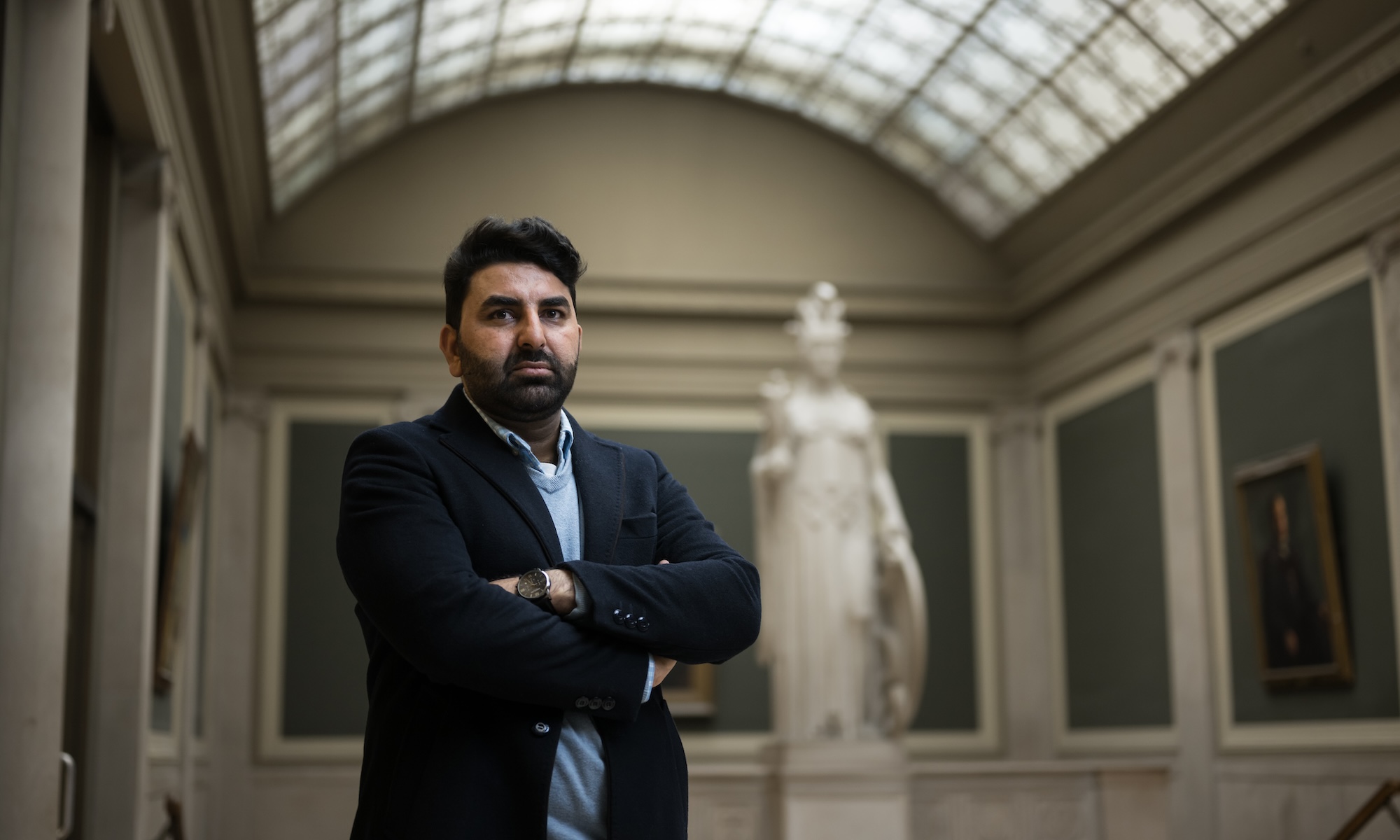The dissident Russian writer is a visiting scholar at Rochester.
Russian poet, journalist, professor, and literary critic Dmitry Bykov is no stranger to the power of words. His satirical poems and sharp political commentaries—often aimed squarely at Russian President Vladimir Putin—did not amuse their subject.
“I think Russian officials hardly know my novels,” says Bykov, who arrived in January as the Humanities Center’s Scholar in Exile. “But some lines from Citizen Poet were well-known among Russian elites,” he says of actor Mikhail Efremov’s performance of his satirical verses. “They used to visit our performances and my lectures, which was fashionable in late 2020.”
The center created the Scholar in Exile program last year with funding from its own resources as well as from the School of Arts & Sciences. The idea behind the program is twofold—to demonstrate a commitment to global academic freedom and to bring prominent and endangered scholars into the campus community where they can work directly with students.
Despite his many hats, Bykov sees himself as a poet first—in Russia, a vocation likened to “a prophet, a pillar of civic disobedience, the best kind of lover, whomever we’d like him to be,” as Bykov told the Los Angeles Review of Books in 2016. Known for his wit and charm, he was so popular that people would line up to pay admission to his public lectures on literature.
Yet, as a radio and television personality and one of Russia’s most outspoken public intellectuals, Bykov hit a sore spot. Running afoul of the Kremlin is what ultimately drew him out of Russia and to the United States.
Bykov’s woes came to a head in April 2019 during a domestic flight to the western Russian city of Ufa. En route to a public lecture, he suddenly fell violently ill, eventually losing consciousness, and slipping into a coma. Five days later, he awoke in the intensive care unit of a specialized neurological clinic in Moscow with no doubt in his mind that he had been poisoned.
“They are typical bureaucrats and feel danger only if you participate in some organized activities,” he says of the Russian government. Back in 2012, Bykov had been a member of the now-defunct Russian Opposition Coordination Council that had tried to plan strategies for opposing Putin’s regime. Clearly that membership had been deemed organized enough. Subsequently, he was banned from appearing on radio or television, fired from universities and two editorial offices, including the newspaper Kommersant, well known for its liberal, independent views.
The council’s roster—which also included Alexei Navalny, the opposition leader who died in prison in February in what Bykov describes as a murder—soon became a checklist for Kremlin-directed secret operatives.
“The poisoners followed the list systematically,” says Bykov, an admirer of Navalny who calls his role as a regime critic “quite modest” in comparison.
Writing frequently about Russian and Soviet historic and contemporary figures and themes, Bykov is a well-known biographer of Russian stalwarts, such as authors Boris Pasternak, Bulat Okudzhava, and Maxim Gorky. In 2005, he wrote How Putin Became President of the USA: New Russian Fairy Tales.
While his work has garnered a variety of Russian literary prizes, including the National Bestseller Prize, three Big Book awards, and the Strugatsky International Literature Prize, some of the titles alone have placed him directly in the Kremlin’s crosshairs. In early 2022, right before Russia invaded Ukraine, the Kremlin declared him a foreign agent and many Russian booksellers pulled his works—some 90 total, including novels, literary biographies, essays, and poetry collections—off their shelves.
Before his move to the United States in 2022, Bykov had held temporary visiting positions at American universities, including at UCLA and Princeton University. In 2022–23, he was a visiting critic at Cornell University’s Institute for European Studies.
Bykov is now at Rochester as a visiting assistant professor in Russian through the 2024–25 academic year.
“He is a huge figure in Russian culture, and it’s something of a miracle that he’s here in Rochester,” says John Givens, a professor of Russian.
This spring, Bykov is teaching courses in the Department of Modern Languages and Cultures, including Hard Labor, Exile, Prison: The Culture of Incarceration in Russia, and Nikolai Gogol and the Creation of Ukrainian Literature.
“It’s not every day that a student can take a class from someone who was poisoned by Vladimir Putin for using his status as a celebrated writer and the public performance of his writings as weapons,” says Givens. “This is a powerful message to students—the ability of art to speak truth to power, and the power of the individual to stand up to tyranny.”
Most recently, Bykov wrote a literary biography about Ukraine’s president Volodymyr Zelensky, VZ: Portrait Against the Background of the Nation (Freedom Letters, 2023).
In the fall, he will teach two courses: Russian Folklore: Ballads, Romances, Tales, Proverbs, Anecdotes and Poetics of Horror: Gothic, Thriller, and Suspense Stories. He also plans several public lectures.
Meanwhile, Bykov is certain that one day he’ll return to Russia, ideally splitting his time between the US and his homeland. Putin, he says, won’t last. “He has no ideas for a new Russia.”
Once Putin is deposed—whether by his inner circle, rebellion, or military defeat—Bykov predicts brief turmoil, “followed by a period of peaceful and fruitful development, and psychological recovery.”
And that, he says, he can’t wait to be part of.




